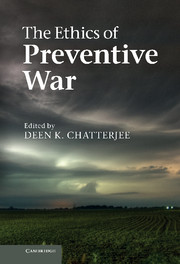Book contents
- Frontmatter
- Contents
- Contributors
- 1 Introduction
- PART I CONCEPTUAL, NORMATIVE, AND METHODOLOGICAL TERRAINS
- PART II INTERNATIONAL LAW
- PART III CRITIQUES OF PREVENTIVE WAR
- PART IV BEYOND PREVENTIVE WAR: EXPLORING OTHER OPTIONS
- 11 Preventive violence: war, terrorism, and humanitarian intervention
- 12 Enough about just war, what about just peace? The doctrine of preventive non-intervention
- Bibliography
- Index
- References
12 - Enough about just war, what about just peace? The doctrine of preventive non-intervention
Published online by Cambridge University Press: 05 April 2013
- Frontmatter
- Contents
- Contributors
- 1 Introduction
- PART I CONCEPTUAL, NORMATIVE, AND METHODOLOGICAL TERRAINS
- PART II INTERNATIONAL LAW
- PART III CRITIQUES OF PREVENTIVE WAR
- PART IV BEYOND PREVENTIVE WAR: EXPLORING OTHER OPTIONS
- 11 Preventive violence: war, terrorism, and humanitarian intervention
- 12 Enough about just war, what about just peace? The doctrine of preventive non-intervention
- Bibliography
- Index
- References
Summary
We can admit the grain of truth in the cynical slogan, “If you want peace, prepare for war,” but the surer path to a more tranquil world is to prepare for peace directly.
C. A. J. CoadyPreventive war short-circuits nonmilitary means of solving problems.
Neta C. CrawfordThe increasingly common “preventive” use of military force and the tragic dilemmas of recent military operations have severely challenged international law in regard to the justification of waging preventive wars for self-defense and under the guise of international peace and security. Also, the growing trend of justifying preventive use of force by invoking principles of the just-war doctrine has left the just-war theorists wondering whether the theory itself is in need of a fundamental shift. This chapter responds to these concerns by placing the debate in the wider discourse of global justice. By invoking the concept of just peace, I discuss prevention from a non-interventionist perspective and show how it can be an effective measure for national security as well as for humanitarian policies. I call this approach “preventive non-intervention” and explain how it is intimately tied to human rights concerns. The best way to prevent a crisis is to ensure justice and fair representation in global governance, for which other means than the use of military force are more prudent and effective. An emphasis on global justice underscores the need for a preventive approach that is non-interventionist; it calls for rooting out the underlying causes of conflict, injustice, and humanitarian crises by a collaborative system of just governance through institutional implementation of rights. The focus is on being proactive by getting involved in issues of economic justice and inclusive democratic-political processes both within countries and especially in the global order.
- Type
- Chapter
- Information
- The Ethics of Preventive War , pp. 214 - 239Publisher: Cambridge University PressPrint publication year: 2013
References
- 2
- Cited by



